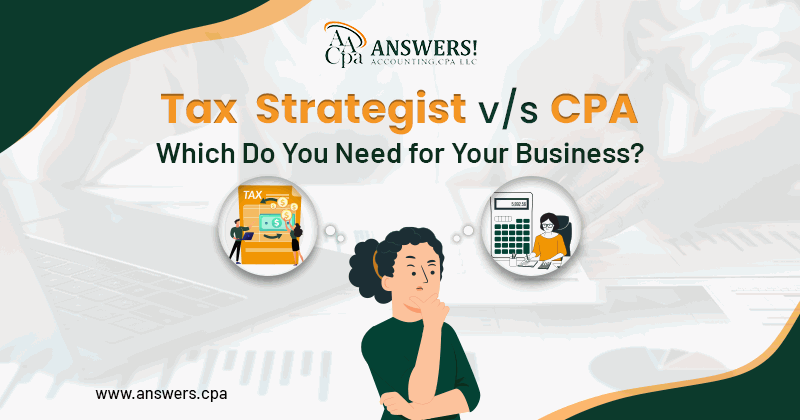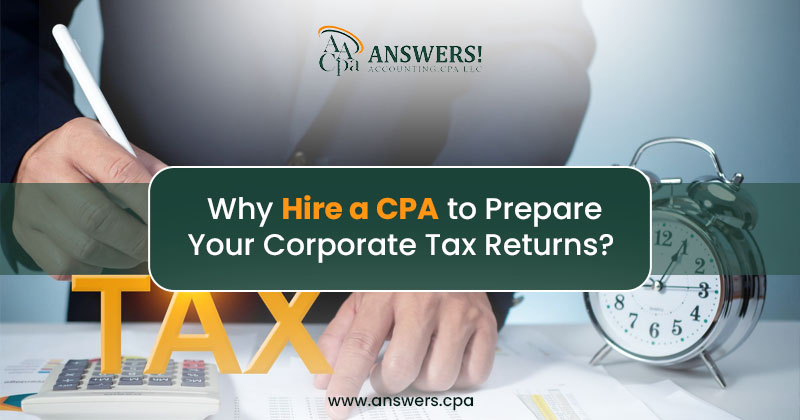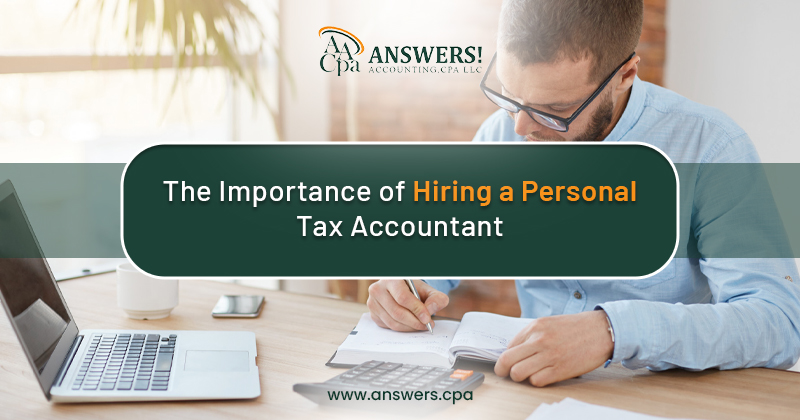Tax Strategist Vs CPA, Which Do You Need
When trying to get financially orderly, you are likely to have heard the term Tax Strategist along with CPA (Certified Public Accountant). Although these two professionals may appear similar, they perform different tasks. To determine which one fits your needs best, we must understand what each does. This blog will also explain in detail the roles of both specialists and give advice on which one is suitable for you.
What Is a Tax Strategist?
Most people are not aware that there are professionals who specialize in helping taxpayers manage their taxes downwards. A tax strategist does not wait until it is time to file returns at the end of the year like an ordinary accountant would do. He looks at his client's finances. He seeks ways to lower their annual tax burden. He also uses strategies to reduce their tax liabilities throughout the year by being proactive, not reactive.
Tax strategists work hand in hand with you to point out areas where you could save money. They use strategies like the right deductions, credits, and other tax-saving options. Their goal is to ensure that the client pays the least tax allowed by law.
Importance of a Tax Strategist
The advantages of working with a tax strategist are primarily looking forward. Unless you know, some money has been taken from your funds. If you own a company or have many investments, taxes will hit you hard. A tax strategist can aid in reducing your yearly paycheck so that towards the end; there are significant amounts saved.
For example, your company is to consult experts on its form and organization to minimize taxes. They help us find ways to benefit from various laws and tax credits. These can give money to both individuals and organizations. All this assistance would be crucial in the complexities surrounding taxation issues.
Roles and Responsibilities of a Tax Strategist
- • Creating Tax Plans: Tax strategists look at your entire financial picture. They come up with a tax plan that is tailored to your needs. This could involve timing your income, maximizing deductions, or restructuring your business.
- • Investment and Retirement Planning: They help you plan for your future by advising on tax-efficient ways to invest your money. They also help you figure out the best time to sell investments to avoid big tax hits.
- • Wealth and Estate Planning: If you have significant wealth or plan to pass on money to your heirs, a tax strategist can help reduce taxes on your estate. This ensures more of your money goes where you want it to go.
- • Year-Round Advice: Unlike tax preparers who you only see during tax season, tax strategists work with you all year long. They keep an eye on changes in tax laws and update your plan as needed.
What Is a CPA?
A CPA (Certified Public Accountant) is a licensed professional. They have passed exams and met strict requirements to provide accounting services. They are known for helping with taxes, auditing, and preparing financial statements among other things. Their profession requires them to stay updated on tax laws. This ensures your compliance with them.
Individuals and corporations can employ the services of CPAs. They provide personal tax advice as well as assist individuals in preparing and filing their taxes. Businesses, on the other hand, handle bookkeeping, audits, and record accuracy.
Importance of a CPA
If you want to be sure that your taxes are filed correctly and that you’re following every single rule then you should consult a CPA. They help avoid causing problems with the IRS and even represent you during audits.
CPAs are crucial for corporations. They organize your accounts and help pay salaries, among other tasks, to prepare for tax season. Besides, they ensure that your company complies with all financial requirements. Also, employing one would save you from making some costly mistakes that could ruin your business in the future.
Roles and Responsibilities of a CPA
- • Tax Preparation and Filing: CPAs ensure your taxes are done right. They prepare your tax return, make sure it’s accurate, and file it on time. This helps you avoid penalties and reduces the risk of an audit.
- • Auditing Services: CPAs can perform audits for businesses. This means they look at your financial records and make sure everything is accurate and complies with government regulations.
- • Bookkeeping and Accounting: CPAs help businesses with everyday financial tasks. This includes managing expenses, payroll, and preparing financial statements.
- • Financial Consulting: CPAs provide advice on financial decisions. Whether you need help with budgeting, planning for growth, or deciding on a business structure, a CPA can guide you.
- • Ensuring Compliance: CPAs make sure your business follows all financial regulations. They stay on top of changing tax laws and ensure you’re always in compliance.
Difference Between a Tax Strategist and a CPA
Now that you know what a tax strategist and CPA do, let’s compare them. Even though both professionals work with taxes, their roles are very different.
| Aspect | Tax Strategist | CPA |
| Main Focus | Helps you reduce taxes by planning and creating strategies to minimize taxes | Prepares taxes, ensures compliance, and provides general accounting services |
| When You Work With Them | Year-round, focusing on planning and making tax-efficient decisions throughout the year. | Typically during tax season, but also helps year-round with financial compliance and record-keeping |
| Scope of Services | Focuses specifically on tax-saving strategies, including investment, estate, and retirement planning. | Offers a wide range of services, including tax filing, auditing, accounting, and financial consulting. |
| Approach | Proactive: Find ways to reduce taxes before you owe them. | Reactive: Ensures taxes are accurate and compliant, while also helping with financial records and audits. |
| Best For | High-income individuals, business owners, and those with complicated tax situations or significant investments. | Individuals or businesses need reliable tax filing, financial management, or compliance checks. |
The Right Choice for You
Deciding between a tax strategist and a CPA depends on your financial goals and needs. Here’s how you can figure out which one is right for you:
Need for a Tax Strategist:
- • Save on taxes year-round: If you’re looking to reduce your taxes throughout the year instead of just during tax season, a tax strategist is the right choice. They help you plan so you pay the least amount of taxes possible.
- • Tackle complicated financial situations: If you own a business, have investments, or are dealing with multiple income streams, a tax strategist can help you find tax-saving opportunities that might not be obvious.
- • Aim long-term tax savings: A tax strategist looks at your entire financial picture and helps you plan for the future. This is especially helpful if you’re thinking about retirement, selling investments, or passing on wealth to your heirs.
Need for a CPA:
- • Tax filing: If you just want to make sure your taxes are done right and filed on time, a CPA is the best choice. They’ll make sure everything is accurate and compliant with the law.
- • Audit or financial statements: CPAs are licensed to perform audits and can help businesses prepare accurate financial records. They are also the ones you want on your side if the IRS ever comes knocking.
- • General accounting: CPAs can manage your business’s finances. They handle everything from payroll to bookkeeping and ensure your financial records are up-to-date.
How Answers Accounting CPA Can Help
- • Tax Planning and Strategy: Our tax strategists develop a customized tax plan for you. We focus on minimizing your tax liability while helping you plan for the future.
- • Expert Tax Filing and Compliance: We ensure your taxes are filed accurately by our CPAs. We ensure that you are always compliant with current tax laws and regulations.
- • Ongoing Financial Support: We do not only appear at tax time. We provide year-round support to keep your finances on track. We can help with bookkeeping, payroll, or financial consulting.
Take Control of Your Taxes
Don't fret when it comes to choosing between a tax manipulator and an accountant who is certified. It merely is a matter of what you require. In case you want to minimize your taxes all year long and even make plans for the future, then the individual advising on tax matters ought to be your companion. They are good at projecting into the future, identifying areas where one might save on taxes, and ensuring that you do not lose out all the money that you worked for. On the other hand, if filing returns or managing daily financial dealings within your business is what worries you most, then a certified public accountant (CPA) will make certain everything stands right before the law.
The sweet part about this is that no choice has to be made. At Answers Accounting CPA, we provide both services under one roof. Our highly skilled tax strategists and certified CPAs work together as a team to provide you with holistic financial support. We have the right expertise to help you succeed whether it involves long-term tax planning, accurate tax filing, or regular financial management for your business. We won't just come during tax season. We'll be available all year. We want to help you keep your finances in order and reach your goals.
Get in touch with us at Answers Accounting CPA today, and let’s work together!
FAQ’s
- Do I need both a CPA and a tax strategist?
For optimal financial management, having both professionals can provide a comprehensive strategy that combines tax savings with accurate reporting. - Can a CPA handle tax planning too?
Yes, CPAs can offer some tax planning services, but a tax strategist typically specializes in finding advanced, long-term tax-saving opportunities. - How can a tax strategist help my business?
A tax strategist can help you minimize taxes by leveraging deductions, credits, and tax laws tailored to your industry and financial situation. - What should I expect from a tax strategist consultation?
In a consultation, a tax strategist will review your financial situation, identify tax-saving opportunities, and help you implement a long-term tax plan. - Are tax strategists only for the wealthy?
No, tax strategists work with individuals and businesses of all sizes to maximize tax savings and plan for future financial success.








